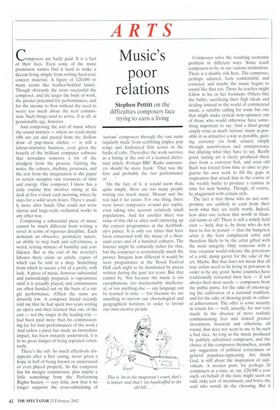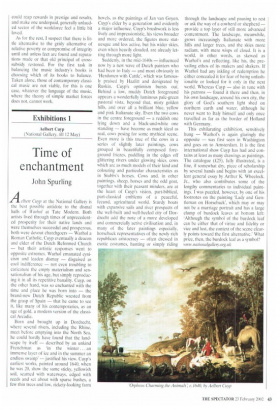Music's poor relations
Stephen Pettitt on the difficulties composers face trying to earn a living
Composers are badly paid. It is a fact of their lives. Even some of the more prominent names find it hard to make a decent living simply from writing hard-core concert material. A figure of £20,000 to many seems like feather-bedded luxury. Though obviously the more successful the composer, and the larger the body of work, the greater potential for performances, and for the income to flow without the need to worry too much about the next commission. Such things tend to arrive, if at all, at pensionable age. however.
And composing the sort of music where the sound matters — where no ready-made riffs are cut and pasted from the shallow draw of pop-music clichés — is still a labour-intensive business, even given the benefit of the brilliant computer software that nowadays removes a lot of the drudgery from the process. Getting the notes, the colours, rhythms, processes, and the rest from the imagination to the paper or screen occupies vast resources of time and energy. One composer I know has a daily routine that involves sitting at his desk at five o'clock each morning, where he stays for a solid seven hours. There's usually more after lunch. One could not write operas and large-scale orchestral works in any other way.
Composing a substantial piece of music cannot be much different from writing a novel in terms of rigorous discipline. Each demands an obsessive, pernickety nature, an ability to step back and self-criticise, a weird, testing mixture of humility and confidence. But at the end of the novelist's labours there exists an article, copies of which can be sold in a shop. Something from which to secure a bit of a profit, with luck. A piece of music, however substantial and painstakingly prepared, is vapourware until it is actually played, and commissions are often handed out on the basis of a single performance. (Often the sums are absurdly low. A composer friend recently told me that he had spent two years writing an opera and then learned that one of the cast — not the singer in the leading role — had been paid more than his commissioning fee for four performances of the work.) And unless a piece has made an immediate impact, has been instantly understood, it is in no great danger of being repeated voluntarily.
There's the rub. So much effectively disappears after a first outing, never given a hope in hell of being known or understood or even played properly. So the composer has his meagre commission, plus maybe a little something from the Performing Rights Society — very little, now that it no longer supports the cross-subsidising of 'serious' composers through the vast sums regularly made from scribbling jingles, pop songs and hackneyed film scores in the backs of cabs. Thereafter the work survives as a listing at the end of a learned dictionary article. Perhaps BBC Radio announcers should be more frank: 'That was the first and probably the last performance of ... '
On the face of it, it would seem that, quite simply, there are too many people writing too much music. Mozart and the rest had it far easier. For one thing, there were fewer composers around per capita, even taking into account relatively small populations. And for another there was none of this old or alien stuff cluttering up the concert programmes at the Archbishop's palace. It is only our times that have been concerned with the music of a thousand years and of a hundred cultures. The listener might be culturally richer for that, but the composer is economically much the poorer. Imagine how different it would be were programmes at the Royal Festival Hall each night to be dominated by pieces written during the past ten years. But that cannot be. Not because the music is too cacophonous, too irredeemably intellectual. or too anything else — any language can be learned in time — but because we are unwilling to narrow our chronological and geographical horizons in order to favour our own creative people. Composers solve the resulting economic problem in different ways. Some teach composers-to-be at our various institutions. There is a double risk here. The composer, perhaps salaried, feels comfortable and cosseted, and maybe the music begins to sound like that too. Those he teaches might follow in his or her footsteps. Others bite the bullet, sacrificing their high ideals and dealing instead in the world of commercial music, a suitable calling for some but one that might make cynical note-spinners out of those who would otherwise have something important to say. And a third group simply write as much 'serious' music as possible in as attractive a way as possible, gaining currency (in both senses) simply through assertiveness and omnipresence but diluting what they have to say. Really good, lasting art is rarely produced these days from a conveyor belt, and even old Bach was forced from time to time to plagiarise his own work to fill the gaps in inspiration that struck him in the course of the weekly battle to produce a cantata in time for next Sunday. Though, of course, he plagiarised with certain style.
The fact is that those who do not compromise are unlikely to earn from their work what they are really worth. Indeed, how does one reckon that worth in financial terms at all? There is still a widely held view — held, that is, by those who do not have to live in penury — that the hungriest artist is the least complacent artist and therefore likely to be the artist gifted with the most integrity. Only someone with a true vocation would tolerate the privations of a cold, damp garret for the sake of the art. Maybe. But that does not mean that all true artists need to be living in privation in order to be any good. Some countries have traditionally rewarded their best — if not always their most needy — composers from the public purse, for the sake of encouraging the cultivation of a national tradition, and for the sake of showing pride in cultural achievement. The offer is some security in return for — well, actually, for not very much. In the absence of more realistic commissioning fees and indeed greater investment, financial and otherwise, all round, that does not seem to me to be such a bad idea. As long as the music produced by publicly subsidised composers, and the choice of the composers themselves, avoids any suggestion of political correctness or general populace-appeasing. Art, thank God, is still about the inspiration of individuals. A modest punt, for perhaps 20 composers at a time, at, say, £20,000 a year each, on behalf of the state might seem an odd, risky sort of investment, and brave the soul who would do the choosing. But it could reap rewards in prestige and results, and make one underpaid, generally unlauded sector of the workforce feel a little bit loved.
As for the rest, I suspect that there is little alternative to the grisly alternative of relative poverty or compromise of integrity until and unless feet are found and reputations made or that old principal of crosssubsidy restored. For the first task in balancing the music industry's books is choosing which of its books to balance. Taken alone, those of contemporary classical music are not viable, for this is one case, whatever the language of the music, where the theory of simple market forces does not, cannot work.







































































 Previous page
Previous page